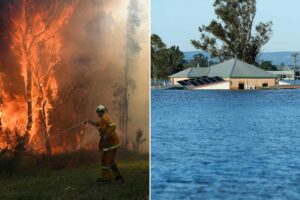Saturday marked the halfway point for the COP26 talks, and it saw tens of thousands of protestors take to the streets of Glasgow to demand more from world leaders, having perceived high profile announcements made earlier in the week are falling short.
There are already signs that the talks are starting to slip from its planned schedule, with negotiators working late into Saturday evening and into Sunday morning in an attempt to resolve outstanding issues.
These are focused mainly on providing compensation to developing countries for the impacts of climate change, the rules of international emissions trading, and ramping up climate ambition. Several key issues will remain unresolved and will now spill over into the second week.
The talks will take a break over Sunday before resuming again on Monday.
Angus Taylor leaves Glasgow half way through talks
Ministers are due to take charge of the talks in the second week, but one who won’t be there is Australia’s federal energy and emissions reduction minister Angus Taylor, who has called time on his participation at the COP26 talks, announcing on twitter that he is leaving Glasgow.
It’s unusual timing for Taylor, given the expectation that ministers are expected to led negotiations during the second week of the UN climate conference.
It will leave Australia represented by diplomats, and without the negotiating clout that comes with having direct ministerial representation that allows countries to make concessions and negotiate outcomes on the fly.
And that’s a wrap on my time in Glasgow at #COP26 . It was fantastic to meet with and hear from world and industry leaders. I was proud to present Australia’s impressive track record and innovation leading the way to net zero. #auspol pic.twitter.com/3nkyN0bhUb
— Angus Taylor MP (@AngusTaylorMP) November 7, 2021
250,000 march in Glasgow calling for stronger climate action
Significant logistical challenges – not all related to Covid-19 protocols – have kept almost all of the non-government observers in Glasgow from actually observing the talks. Many delegates have turned to lead protests outside of the COP26 venue to demand stronger action on climate change.
Organisers estimated that 250,000 protestors took to the streets in Glasgow on Saturday, expressing frustration that insufficient progress had been made during the talks so far, as part of coordinated protests held around the world.
“As week one of COP26 comes to an end, people are taking to the streets today demanding justice. So far COP26 has been high on grandstanding climate declarations and pledges and low on real commitments, especially on finance and importantly, finance for loss and damage caused by climate change,” Tasneem Essop, executive director of Climate Action Network, said.
“Next week must be a return to the drawing board to finalise a plan that truly responds to the needs of people on the frontlines of the climate crisis. We demand that leaders step up and deliver real solutions and not just smoke-and-mirror declarations.”
Thunberg labels COP26 a failure and PR stunt
Youth activist Greta Thunberg has labelled the COP26 talks a “failure” and serving primarily as a “PR exercise” for world leaders and businesses to make announcements about climate pledges, without committing to sufficient new policies and underlying commitments to transition away from fossil fuel to adequately keep global warming to within safer levels.
“It is not a secret that COP26 is a failure. It should be obvious that we cannot solve a crisis with the same methods that got us into it in the first place.” Thunberg told a protest in Glasgow.
“This is no longer a climate conference, this is now a global greenwashing festival.”
Today hundreds of thousands all over the world marched for the climate, sending a clear signal to people in power at #COP26 to protect people and planet. Our so-called “leaders” aren’t leading – THIS is what leadership looks like! #UprootTheSystem
📸: Glasgow, Oliver Kornblihtt pic.twitter.com/v9zbicTGcb— Greta Thunberg (@GretaThunberg) November 6, 2021
Australia receives its third “fossil of the day” award
The first week of COP26 has seen Australia emerge again as a main antagonist of the talks, with environment groups at the Glasgow talks awarding Australia its third “fossil of the day” award on Friday.
Australia is the only country to have received the dubious honour more than once so far in Glasgow – and it has now received three – the latest for an announcement from resources minister Keith Pitt that Australia was seeking to open up as many as ten offshore regions around Australia for oil and gas exploration.
Environment groups saw the announcement as extraordinary, with Australia planning to expand its fossil fuel industries while countries are meeting to discuss how to best tackle climate change.
In second place, the 2nd 🏆#FossiloftheDay🦖 Award🏆 goes to…
🇦🇺 Australia for initiating talks 10 new areas for offshore petroleum exploration – on top of already being a top exporter of coal and gas 🏭
Read: https://t.co/UwHa8qtpui pic.twitter.com/SrKJIBJI2Z
— Climate Action Network International (CAN) (@CANIntl) November 6, 2021
COP26 is already running behind schedule
Virtually every round of annual UN climate talks runs overtime and it is already evident that COP26 in Glasgow is going to be no different.
UK MP Alok Sharma, who serves as president of COP26, had expressed hopes that negotiators would be able to report progress on Saturday – making the halfway point in the two-week conference – identifying areas of agreement and outstanding matters for further discussion.
Sharma had planned to hold a “stocktaking” plenary on Saturday evening to provide an update on where the talks stood, but with negotiators still working to settle issues and talks spilling over into Sunday morning without resolution, this “stocktaking” was delayed until Monday morning (Glasgow Time).
Negotiators outline areas of concern
With Saturday marking a transition point for the COP26 conference, negotiators reported the progress they had made on some of the more technical issues being considered in Glasgow.
Discussions ran overtime on Saturday, as designated facilitators of different negotiating streams sought to identify where countries were able to reach an agreement, as well as those issues that remain contentious and will be taken up for higher-level negotiations when the respective environment and climate change ministers take carriage of the talks into the second week.
Discussions on “Article 6” of the Paris Agreement, which includes issues relating to potential mechanisms for international emissions trading schemes, and what will come of emissions credits leftover from the Kyoto Protocol, remain unresolved and will continue to be the focus of negotiators attention.
There continues to be a strong push for a “loss and damage” mechanism – where vulnerable countries are compensated for the impacts of climate change, but it also remains controversial, with wealthy countries hesitant to take responsibility for historical contributions to global warming.
Discussions on how to best increase financial commitments to climate action, as well as increasing ambition to cut emissions with also carryover in to the second week. Negotiators from several countries were unhappy with references to the need to recognise human rights being removed from draft decision texts.
Many countries taking the floor to lament the exclusion of human rights and gender from the Action on Climate Empowerment outcome. #COP26
— Earth Negotiations Bulletin (@IISD_ENB) November 6, 2021










